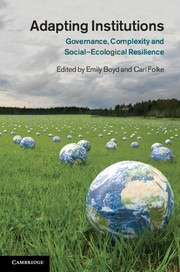Book contents
- Frontmatter
- Contents
- Illustrations
- Contributors
- Foreword
- Acknowledgements
- Acronyms and abbreviations
- 1 Adapting institutions, adaptive governance and complexity: an introduction
- Part I Adapting local institutions, networks, leadership and learning
- Part II Adapting and governing public institutions for uncertainty and complexity
- Part III Adapting multi-level institutions to environmental crisis
- 9 Double complexity: information technology and reconfigurations in adaptive governance
- 10 Adaptive governance and natural hazards: the 2004 Indian Ocean tsunami and the governance of coastal ecosystems in Sri Lanka
- 11 Adapting to global climate change: evaluating resilience in two networked public institutions
- 12 Conclusions: adapting institutions and resilience
- Index
- References
11 - Adapting to global climate change: evaluating resilience in two networked public institutions
from Part III - Adapting multi-level institutions to environmental crisis
Published online by Cambridge University Press: 05 November 2011
- Frontmatter
- Contents
- Illustrations
- Contributors
- Foreword
- Acknowledgements
- Acronyms and abbreviations
- 1 Adapting institutions, adaptive governance and complexity: an introduction
- Part I Adapting local institutions, networks, leadership and learning
- Part II Adapting and governing public institutions for uncertainty and complexity
- Part III Adapting multi-level institutions to environmental crisis
- 9 Double complexity: information technology and reconfigurations in adaptive governance
- 10 Adaptive governance and natural hazards: the 2004 Indian Ocean tsunami and the governance of coastal ecosystems in Sri Lanka
- 11 Adapting to global climate change: evaluating resilience in two networked public institutions
- 12 Conclusions: adapting institutions and resilience
- Index
- References
Summary
Introduction
From a sociopolitical perspective, a crisis results from a breakdown in collective sense-making or role structure, or from the failure of followers’ belief in leadership and cultural norms (Habermas 1975, Turner 1976, O’Connor 1987, Weick 1993, Wang 2008). While climate change exhibits many of these factors, it will also entail a host of biophysical changes, such as droughts, floods and extreme events. A combination of social and biophysical understandings is therefore pertinent to the analysis of institutional responses to climate-change risks. Institutions are broadly defined in this chapter as the ‘rules of the game’ that emerge from formal and informal norms, practices and organisational structures. Some institutions with a role and function in delivering aid or cultivating relations with governments in the global South are beginning to think about how to integrate information on climate change into their projects, programmes and strategies. These institutions are increasingly confronted with managing difficult climate-related decisions under conditions of imperfect and uncertain information. In this context, this chapter aims to address unanswered questions such as how institutions are adapting in practice, whether they are adapting successfully and whether they are adapting beyond business-as-usual.
Public institutions have an important role in leading action on adaptation policy, but they also face potentially difficult challenges in ensuring feedback within their networked systems (Davies 2004, 2005). This chapter builds on a study by Boyd and Osbahr (2010), which compared the features of adaptive capacity and social learning in four UK-based development organisations. This chapter focuses instead on how two networked public institutions are adapting to climate change, examining through a resilience lens whether these institutions are adapting beyond business-as-usual and how resilient their responses to climate change are. The chapter looks at two government departments, the Department for International Development (DFID) and the Foreign and Commonwealth Office (FCO), as these traditionally play a central role in delivering development aid and security to public and civil society actors and communities in the global South. The UK has a history of international development that is linked closely to its colonial heritage (Harriss 2005). The representation of development as a Western philanthropy has evolved over time, yet remains part of the vision and mandate of many UK institutions that are engaged in and provide the delivery of financial resources, capacity and support for development assistance (Kothari 2005). These institutions are networked across hundreds of country offices across the globe. They are distinct in size, structure, history, ideology and culture, yet also have a common mandate to address climate-change risks, security and poverty and to enhance resilient development. In this chapter, I focus only on the experts at the strategic level, as this is where the responsibility for decisions about design, funding and institutional policy in particular lies.
- Type
- Chapter
- Information
- Adapting InstitutionsGovernance, Complexity and Social-Ecological Resilience, pp. 240 - 263Publisher: Cambridge University PressPrint publication year: 2011
References
- 1
- Cited by



